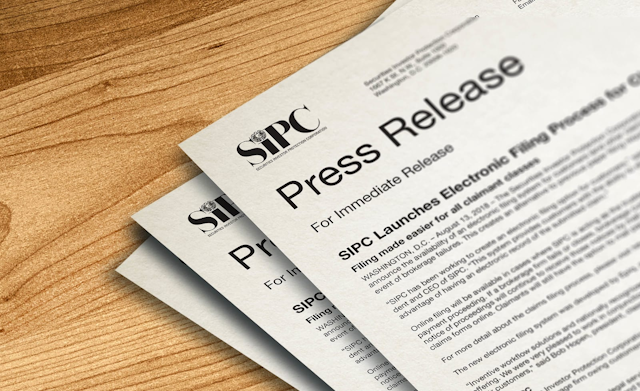After the liquidation proceeding involving my old brokerage firm started, I received a notice that my account was transferred to another brokerage firm. Should I still file a claim?
Yes. Even If you receive a notice that your account has been transferred you should file a claim with the Trustee. The Trustee will take the account transfer into consideration when reviewing/determining claims. SIPC cannot protect you if you do not file a claim. If anything goes wrong with the transfer of your account, filing a claim is the only way you will be able to receive SIPC protection.
How should I send my claim form to the Trustee?
We strongly recommend that your Customer Claim Form be filed electronically with the Trustee. When filing electronically, you will receive an email confirming receipt. If, however, you choose to mail a claim form to the Trustee, we urge you to send it via certified mail, return receipt requested, or by similar means that will enable you to receive written confirmation of delivery to the Trustee. This written confirmation will be proof of receipt by the Trustee and of the date of receipt.
Can I send the claim form by regular mail?
Yes, but to ensure that your claim is received you should send your claim by certified mail, return receipt requested, or by similar means that will enable you to receive written confirmation of delivery to the Trustee.
How does the Trustee get paid?
The Trustee’s fees and expenses are reviewed by SIPC and approved by the Court. All fees and expenses are paid from either the SIPC Fund as "advances" to the estate or from the general estate. These fees and expenses are "general creditor" claims that are repaid to SIPC to the extent that the firm has any general estate assets. The Trustee’s fees are NOT paid from customer assets.
I am a vendor/service provider/landlord to the brokerage firm. What kind of claim form do I file?
Vendors, service providers, landlords, and others with claims that do not arise out of a broker-customer relationship should file a general creditor claim.
I didn't get a claim form. What should I do?
An instruction to file a claim electronically, or the ability to print a written claim form for open cases, may be found at All Open Cases. The All Open Cases page will indicate if a claim form is not yet available. If you would like a copy of the claim form to be sent to you, please Contact Us.
I don’t understand how to fill in the claim form. Where can I get help?
Each claim form is accompanied by a set of instructions. If after reading the instructions, you still have questions, you can Contact Us.
I made a mistake on the claim form. What should I do?
Send a signed statement, in writing, to the Trustee, explaining the mistake. You may fill out a new customer claim form, but please indicate that it is an amended form.
I only see one deadline for my brokerage firm. Why is that?
In a direct payment procedure, unlike a case where a Trustee is appointed, there is only a 6 month filing time period.
I see that there are 2 filing deadlines for my brokerage firm. What happens to my claim if I miss the first deadline but file my claim within 6 months?
Under the Securities Investor Protection Act, if you file a claim within the first Court deadline (usually either 30 or 60 days) and you request that the Trustee return securities to you, the Trustee must return securities unless the Trustee does not have the securities and the securities cannot be purchased in a fair and orderly market. If you file after the first Court deadline but within the 6 month period and request securities, the Trustee has the option of delivering securities or returning cash to you in the amount that the security was worth on the filing date.
I think I was a victim of fraud. My brokerage convinced me to buy securities that went down sharply. Can the Trustee return the amount of my initial investment?
No. SIPC does not protect you against market losses in the value of your shares.
I’m worried I’m going to make a mistake on the claim form. What are the most important things to remember?
- Sign your claim form.
- Provide correct and complete contact information.
- File the claim within the six-month deadline.
- Fill out the claim form completely and accurately. Incomplete or inaccurate claim forms may delay processing of your claim.
- Attach copies of all documents that are relevant to your claim. Failure to attach such documents may result in delays or even, in some cases, denial of claims.
- Keep a copy of everything you send to the Trustee for your records.
If my account is transferred, how long will it take for me to get control of my account again?
Every liquidation proceeding is different. In some instances, a Trustee may be able to transfer accounts in as little as one to three weeks. However, if the records of the defunct brokerage firm are in disarray, or if for any other reason it is not possible to transfer your account to a financially healthy brokerage firm, the process may take more time. Filing your claim promptly, correctly and with all required documentation will help to expedite the claims review/determination process, and the return of your assets to you.
Should I submit original documents when filing the claim form?
You should never submit original documents to SIPC. When filing your claim electronically, you will be uploading electronic copies of documents. If you choose to mail your claim to the Trustee, please be aware that originals that are lost in the mail may be difficult or even impossible to replace. In that case, please make copies of all your attachments and then submit the copies of the attachments.
What are "customer name securities"?
Customer name securities are securities that are registered directly in the name of the customer and are held in custody at the brokerage firm. Customer name securities are returned to their owner even if their filing date value is more than $500,000. A signed stock power attached to a security, even if blank, may render the security no longer in “customer name.” If a security is no longer in "customer name," it is treated like other securities held by the brokerage for customers and becomes part of the fund of customer property.
What are SIPC "advances"?
SIPC "advances" money to the Trustee to enable the Trustee to satisfy customer claims and to pay certain administrative expenses. These funds are referred to as “advances” because in certain circumstances, SIPC gets paid back from assets held by or belonging to the broker-dealer. For example, administrative expenses of the liquidation proceeding may be paid from the "general estate," meaning that SIPC will get repaid for the administrative expenses advanced to the Trustee to the extent that the firm has any general estate property.
What are the limits of SIPC protection?
Customers are protected against the loss of cash and securities up to $500,000. Of the $500,000, up to $250,000 may be for the loss of cash.
What happens if I don’t agree with the Trustee’s determination letter?
In a liquidation proceeding, if you do not agree with the Trustee’s determination letter, you will have 30 days from the date of the determination letter to object to the determination, in writing. Instructions for objecting to the determination, including which court to submit the objection, are included in the determination letter. In a Direct Payment Procedure, if you do not agree with the determination letter, you will have six months from the date of the determination letter to commence a civil action in bankruptcy court to seek a final adjudication of your claim. The bankruptcy court with jurisdiction over that civil action will be identified in the determination letter.
What happens if I file a customer claim after the 6 month deadline?
The Trustee is prohibited from using SIPC funds to satisfy customer claims that have been denied due to a late filing. Except in very limited circumstances, Federal law requires claims to be filed within the 6 month deadline. See Securities Investor Protection Act section 78fff-2(a)(3).
What happens if my claim is over the SIPC limits of protection?
All customers who are eligible share in any customer property collected by the Trustee. Because collecting this property can take time, the Trustee uses funds “advanced” by SIPC to return customers’ cash and securities, up to the limits of SIPC protection. As a result, customers typically can recover their cash and securities sooner. If your claim is over the limits of SIPC protection, you will share in customer property equally with all other customers, and if after having had your claim satisfied out of SIPC advances and receiving your share of customer property, your claim still is not fully satisfied, you will be eligible to receive a distribution as a general creditor to the extent that there are any general estate assets.
What is "net equity"?
"Net equity" is the cash and securities held by a broker for a customer, minus any amount owed by the customer to the broker.
What is a "determination letter?
In a liquidation proceeding, the Trustee sends a determination letter to each claimant who has filed a claim, notifying the claimant whether or not the claim has been allowed or denied, and if allowed, in what amount in cash and/or securities. In a Direct Payment Procedure, SIPC sends the determination letter to the claimant.
What is a "filing date"?
The filing date usually is the date that SIPC files an application in court to initiate a liquidation proceeding. For Direct Payment Procedures the filing date is the date that notice of the Direct Payment Procedure is published in the newspaper. The All Open Cases page lists the filing dates for all open SIPA liquidations.
What is a general creditor claim?
A general creditor claim typically is a claim against the brokerage firm that does not arise out of the broker-customer relationship. For example, a claim for rent by the landlord of a brokerage firm would be a general creditor claim and would not be protected by SIPC as a customer claim. (A customer claim that is not fully satisfied from customer property and SIPC funds automatically becomes a general creditor claim.)
What is SIPC's relationship to the outside Trustee?
The outside Trustee is independent of SIPC. The Trustee has a fiduciary duty to all customers and creditors. SIPC maintains a close relationship with the Trustee and the Trustee’s counsel and, consistent with the Securities Investor Protection Act, takes an active role as a party in the conduct of the proceeding.
Will general creditors in my case get paid?
Every case is different. The size of the general estate depends on the amount of assets of the firm that the Trustee is able to collect.
































